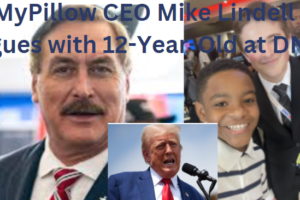The Impact of Trump Bashing on Democratic Campaigns
When we talk about the impact of Trump bashing on Democratic campaigns, it’s hard not to feel the heat of political discourse in the air. Many of us have seen how the political landscape has shifted dramatically since Donald Trump took office. The way Democrats have responded to Trump has shaped their campaigns and strategies in ways we can’t ignore. So, what’s really going on here? Let’s dive into the details and explore how this dynamic plays out in the lead-up to the 2024 Presidential Election.
Historical Context
To understand the impact of Trump bashing on Democratic campaigns, we need to look back at how things have evolved. Remember the 2016 election? Hillary Clinton’s campaign was a masterclass in using Trump’s own words against him. She highlighted his controversial statements, which resonated with many voters who were tired of his rhetoric. This strategy showed how effective Trump bashing could be. Fast forward to the 2020 election, where Joe Biden took the helm. Biden’s campaign focused heavily on contrasting his leadership style with Trump’s often divisive approach. The Democratic Party realized that Trump bashing wasn’t just about insults; it was about framing the narrative. By painting Trump as a threat to democracy, they aimed to mobilize voters who were concerned about his policies. This approach was crucial in battleground states, where every vote counted.
Key Takeaways from Past Campaigns
- Utilizing Trump’s Rhetoric: Democrats effectively used Trump’s own words to highlight his flaws.
- Framing the Narrative: Bashing Trump became a way to define their campaign’s identity.
- Mobilizing Voters: The focus on anti-Trump sentiments helped increase voter turnout.
Current Landscape
Now, as we approach the 2024 Presidential Election, the impact of Trump bashing on Democratic campaigns is more relevant than ever. The Democratic National Committee (DNC) is gearing up for a campaign that will likely revolve around contrasting their policies with Trump’s past administration. But what does this mean for voters? It means that we’ll see a lot of political ads highlighting the negative aspects of Trump’s presidency. These ads will likely focus on issues like healthcare, immigration, and economic inequality. Democrats are aware that many voters are concerned about these topics, and they plan to leverage that concern.
Strategies for the 2024 Election
- Highlighting Policy Differences: Expect to see ads that clearly outline how Democratic policies differ from Trump’s.
- Focusing on Voter Concerns: Campaigns will likely address issues that matter most to voters, such as healthcare and job security.
- Utilizing Social Media: Democrats will use platforms like Twitter and Instagram to spread their anti-Trump messages quickly.
Impact on Voter Turnout
One of the most significant aspects of the impact of Trump bashing on Democratic campaigns is its effect on voter turnout. We’ve seen in previous elections that when Democrats focus on Trump’s rhetoric, it can energize their base. Voters who might have been apathetic suddenly feel a sense of urgency. This was evident in the 2020 election, where many first-time voters came out to oppose Trump. So, how does this translate to the upcoming election? Democrats are likely to emphasize the importance of voting as a way to counteract Trump’s influence. They’ll remind voters that their participation is crucial in shaping the future of the country.
Key Factors Influencing Voter Turnout
- Energizing the Base: Anti-Trump sentiments can motivate voters who feel strongly against his policies.
- Mobilizing First-Time Voters: Campaigns will target young voters who are concerned about their future.
- Addressing Voter Suppression: Democrats will highlight issues related to voter suppression that have emerged during Trump’s presidency.
Case Studies
Let’s take a closer look at some examples of how Trump bashing has influenced Democratic campaigns. In the 2018 midterms, many Democratic candidates ran on platforms that directly opposed Trump’s policies. For instance, candidates like Beto O’Rourke and Andrew Gillum used their campaigns to highlight the dangers of Trump’s immigration policies. They focused on how these policies affected families and communities, which resonated with many voters .This strategy not only helped them gain traction but also inspired other candidates to adopt similar approaches.
Examples of Effective Campaigns
- Beto O’Rourke: His campaign focused on immigration reform and highlighted the human impact of Trump’s policies.
- Andrew Gillum: He emphasized healthcare access and how Trump’s administration threatened it.
Future Implications
So, what does the future hold for the impact of Trump bashing on Democratic campaigns? As we look ahead to the 2024 election, it’s clear that this strategy will continue to play a significant role. Democrats will likely refine their messaging to ensure it resonates with a broader audience. They’ll need to balance their anti-Trump rhetoric with positive messaging about their own policies. This is crucial because while bashing Trump can energize the base, it’s equally important to attract undecided voters.
Predictions for the 2024 Campaign
- Refined Messaging: Expect Democrats to craft messages that are both critical of Trump and positive about their vision.
- Broader Audience Engagement: Campaigns will focus on reaching out to independents and moderates.
- Increased Use of Digital Platforms: Social media will be a key tool for spreading their message quickly and effectively.
The impact of Trump bashing on Democratic campaigns is undeniable. As we move closer to the 2024 Presidential Election, it’s clear that this strategy will shape the political landscape. By understanding how this dynamic influences voter behavior, we can better anticipate the outcomes of future elections. Whether you’re a staunch Democrat or just someone trying to make sense of the political chaos, it’s essential to stay informed. The conversation around Trump and his impact on the Democratic Party is far from over. In fact, it’s just getting started. Stay engaged, and let’s see how this unfolds in the coming months!
The impact of Trump bashing on Republicans and undecided voters is a complex and multifaceted issue that reflects the evolving dynamics of American politics. As political discourse becomes increasingly polarized, understanding how Trump’s rhetoric affects both his party and those who remain on the fence is crucial.
The Influence on Republicans
Shifting Party Dynamics
Trump’s influence on the Republican Party has been profound. His style of politics, characterized by aggressive rhetoric and a confrontational approach, has reshaped the party’s identity. Many Republican leaders have found themselves navigating a delicate balance between loyalty to Trump and their traditional values. For instance, some Republican senators have openly criticized Trump on various issues, including foreign policy decisions and responses to domestic crises. However, this criticism often comes with caution, as many party members fear alienating Trump’s base. This tension illustrates the ongoing struggle within the party to reconcile traditional conservative principles with the populist wave Trump has inspired.
Loyalty and Division
Trump’s supporters are fiercely loyal, and this loyalty often translates into pressure on Republican lawmakers to align with his views. For example, after Trump publicly criticized a proposed national security vote, many Republicans shifted their positions to avoid backlash from his base. This phenomenon highlights how Trump’s bashing of traditional Republican stances can lead to a significant realignment within the party, forcing members to adopt more extreme positions to maintain support. Moreover, Trump’s rhetoric has created a divide among Republicans. Some members, like Senator J.D. Vance, who were initially critical of Trump, have shifted their stance to align more closely with him. This shift underscores the reality that dissenting voices within the party risk losing their political relevance in an era dominated by Trump’s influence.
The Impact on Undecided Voters
Polarization and Alienation
For undecided voters, the impact of Trump bashing is equally significant. Many individuals in this group are turned off by the vitriol that characterizes much of the political discourse surrounding Trump. As Democrats focus their campaigns on bashing Trump, they risk alienating moderate voters who may be seeking more constructive dialogue. The continuous cycle of negative rhetoric can create a sense of disillusionment among undecided voters. They may feel that neither party is addressing their concerns, leading to apathy and disengagement from the political process. This disengagement can have long-term implications for voter turnout and the overall health of democracy.
The Role of Sympathy
Interestingly, while Trump bashing may energize some voters, it can also create sympathy for Trump among undecided voters. When Trump faces criticism, especially from prominent Democrats, some voters perceive him as a victim of the political establishment. This perception can lead to increased support for him, as individuals rally around the idea of an outsider fighting against a corrupt system .For example, following the backlash against Trump after various controversies, some undecided voters may view him as a champion of their frustrations. This dynamic complicates the narrative for Democrats, who must balance their criticisms with messages that resonate with moderate voters.
Messaging Strategies
Constructive Criticism vs. Attack Politics
To effectively engage undecided voters, Democrats may need to refine their messaging strategies. Instead of solely focusing on bashing Trump, they could benefit from presenting constructive alternatives to his policies. By addressing the issues that matter most to undecided voters—such as healthcare, job security, and education—Democrats can create a more appealing narrative. Moreover, framing their criticisms in a way that emphasizes the implications of Trump’s policies rather than personal attacks may resonate better with moderate voters. This approach can help bridge the gap between passionate opposition to Trump and the need for a more inclusive political dialogue.
Engaging the Base without Alienating Others
For Republicans, navigating the impact of Trump bashing requires a careful balancing act. While maintaining loyalty to Trump is crucial for many party members, they must also consider the broader electorate. Engaging in constructive dialogue about policy issues and avoiding extreme rhetoric can help attract undecided voters who may be disillusioned with the current political climate. Republican leaders who can articulate a vision that transcends Trump’s divisive rhetoric may find success in appealing to a wider audience. This strategy could involve focusing on traditional conservative values while acknowledging the concerns of those who feel left behind by the political establishment.
To Sum Up
The impact of Trump bashing on Republicans and undecided voters is a dynamic and evolving aspect of American politics. As the political landscape continues to shift, understanding the nuances of this influence will be crucial for both parties. For Republicans, the challenge lies in balancing loyalty to Trump with the need to appeal to a broader electorate. For Democrats, crafting a message that resonates with undecided voters while effectively opposing Trump will be key in the upcoming elections. Navigating this complex terrain will require both parties to adapt their strategies and engage in meaningful dialogue with voters. The stakes are high, and the outcomes will shape the future of American politics for years to come.












